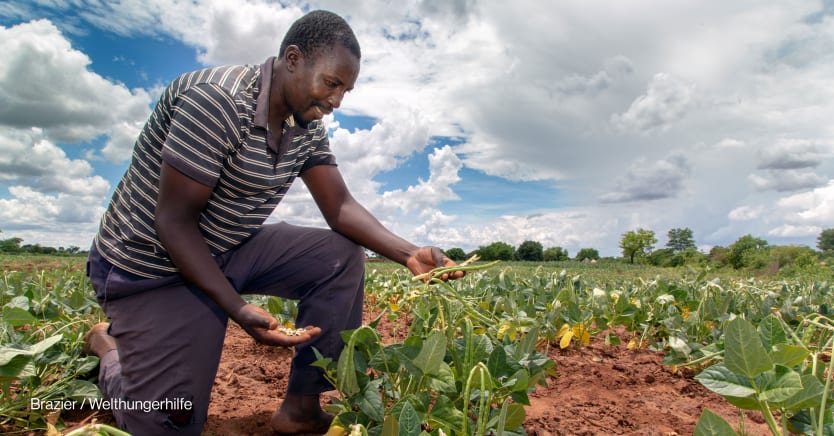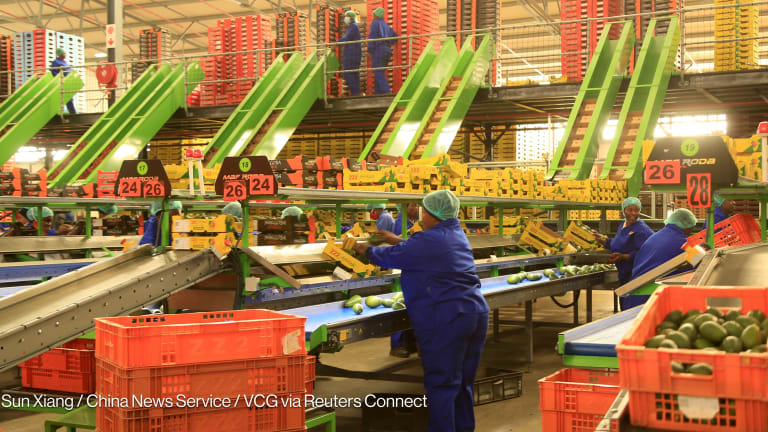
Global hunger is on the decline again, but the trend is deceiving. In Africa, hunger has increased, leaving 307 million people undernourished and over 1 billion people unable to afford a healthy diet in 2024. The outlook is grim for the 36 African countries with serious or alarming levels of hunger. Although these countries are brimming with visionary and innovative youth, companies, civil society, and political players, their food systems are also grappling with rising and multidimensional fragility from conflict, debt, and faltering multilateral cooperation, as well as the interlinked climate, food, land, and water crises.
Welthungerhilfe, or WHH, an international NGO that expends about $400 million annually to help transform systems for zero hunger on a healthy planet, cultivates multistakeholder partnerships with youth, communities, civil society, governments, the private sector, and researchers in 17 African countries to accelerate progress on the Comprehensive Africa Agriculture Development Programme, or CAADP.
With the 2025 Africa Food Systems Forum in Dakar just around the corner, here are three key action points that our evidence and experience show can help to make food systems work in fragile settings.
1. Dare to place bold bets, but do it together
Almost anyone we know would agree that bold food system action is needed and that everyone needs to collaborate more. The difficult part is to develop the shared knowledge and vision necessary to identify the most transformative leverage points and work on them coherently.
To reinforce trust, collective learning, knowledge sharing, and visioning, WHH has developed a pragmatic approach to food systems transformation, which breaks transformation processes down into key actions that can be implemented in multistakeholder processes. WHH’s approach is documented in its operational Food System Framework and supported by the most comprehensive Food Systems Toolkit to date.
Using the Food System Framework, WHH has facilitated collective trust-building, assessments, visioning, and action in 11 countries and counting, and catalyzed collaborative action on risky but transformative leverage points. For instance, WHH and partners re-built and strengthened the national seed system in the Central African Republic; catalyzed land reforms for women and youth through multi-player partnerships in Liberia; improved access to the right to food in Malawi through civil society coalitions and participatory planning; and developed nutrition-sensitive market systems for nutrient-dense and climate-smart “opportunity crops” in most countries where we work, such as bambara nuts in Zimbabwe or orange-flesh sweet potato in Burundi.
These actions were bold, risky, long-term bets. But they paid off because they were based on shared trust, learning, knowledge, and vision between food system players, with women and youth at the center. More efforts need to go into bringing everyone to one table and building trust, knowledge, and vision — not just putting plans together.
2. Prioritize win-wins, not just quick wins
Cash, seeds, food, large-scale fortification — implementing agencies and funders alike are increasingly turning to scalable quick wins to make progress on targeted food system outcomes in fragile settings. In many places, these interventions are an indispensable lifeline for undernourished people. But on their own, they are not enough to break the vicious cycles that drive the multidimensional nature of fragility and food system failure.
To secure lasting progress, we must complement “quick-wins” with “win-win” initiatives that deliver deep-seated and mutually reinforcing benefits for people and the planet. By prioritizing quick wins alongside win-wins, we can address urgent needs while building the foundations for longer-term sustainable and resilient nutrition, economies, societies, and ecosystems.
So, what are some of the most overlooked win-wins? New evidence shows that nutrient-dense and climate-smart opportunity crops can contribute substantially to closing micronutrient intake gaps while reducing risk and increasing resilience. Many of these opportunity crops are particularly well-suited for resource-poor farmers in fragile settings, and are also becoming increasingly attractive for researchers, breeders, and entrepreneurs alike.
Other win-wins to watch out for include policies for scaling soil health, land rights, genomic research, national breeding and seed systems, sustainable small-scale irrigation, high-precision technologies, optimized agricultural inputs and timing, early warning systems, and nutrition-sensitive food processing and conservation. These leverage points have the potential to attract young innovators, create future-fit jobs, and enable investment and impact at scale for both people and the planet.
3. Increase and de-risk investment
Least developed countries, or LDCs, bear the brunt of the climate crisis and global inequality but have a lower capacity to cope with these shocks. Yet, they receive the least financing to overcome the resulting challenges. Governments must up their investments in agriculture and consider repurposing agricultural subsidies toward win-wins for LDCs.
Private investment must also be de-risked. Take the low adoption rates of certified seed in sub-Saharan Africa, for instance. During participatory field research in the Central African Republic, we found that certified seed yielded substantial yield improvements. Yet, seed producers hesitated to pay for certification services because their sales were bottlenecked by farmers’ production risks, which lowered their ability and willingness to pay for certified seeds.
As the Malabo-Montpellier Forum’s latest report on agrifood system financing shows, de-risking policies such as guarantee schemes, smart subsidies, and liquidity instruments can provide additional investment, overcome cash-flow constraints, and boost overall food system outcomes.
Transformation is possible, but complacency is costly
At the Africa Food Systems Forum, the question of how to make food systems work in fragile settings will need to take center stage. Complacency would send the cost of transformation skyrocketing and nutrition, economies, and ecosystems spiraling. But courageous and smart investments into win-wins, identified through inclusive multi-stakeholder processes, could put food systems in fragile settings on a positive trajectory and accelerate progress against the CAADP.
To learn more about Welthungerhilfe’s work, visit welthungerhilfe.org.











